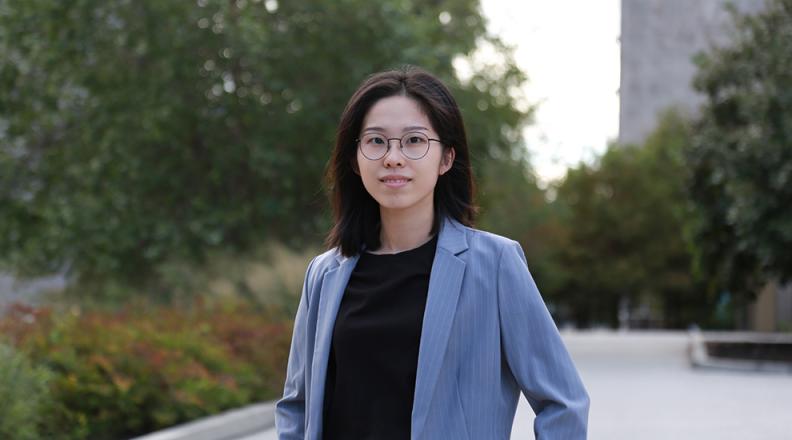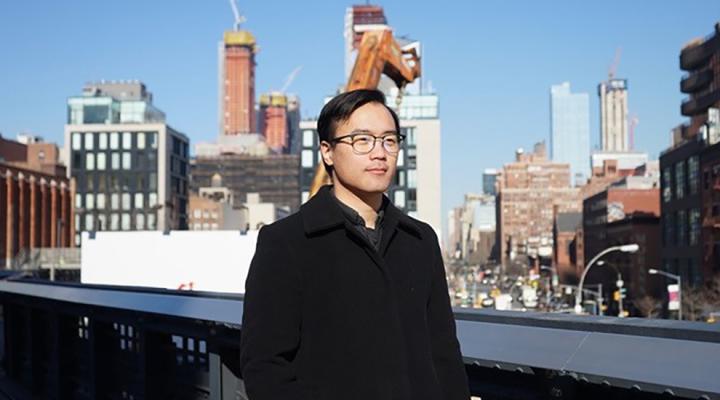Yang Yang is a doctoral student in systems engineering from Shanghai, China. She earned her bachelor's degree in engineering from Tongji University and her M.S. from Cornell University, majoring in architecture. Currently, she is pursuing research in urban mobility modeling under the supervision of Timur Dogan, associate professor (architecture); Samitha Samaranayake, assistant professor (civil and environmental engineering); and Kieran Donaghy, professor emeritus (city and regional planning).
What is your area of research, scholarship, or work and why is it important?
My research focuses on understanding and modeling the interplay between the transportation system, the built environment, and population demographics using machine-learning and multi-agent modeling techniques. I mainly work on developing simulation tool and quantitative measures to assess impacts of urban design and planning on transportation outcomes. Much of my research culminated in the creation of Urbano.io, a multiagent framework for generating individual-level trip data with unparalleled resolution, efficiency and versatility. A prototype of this tool was released as a plug-in for the Rhino3D & Grasshopper platform and gained over 18,000 downloads to date by architects and urban designers. My continuous research substantially enhanced its capabilities, resulting in a forthcoming release which will be compatible with both the Rhino and ArcGIS platform. Additionally, I work on coupling the mobility model with building energy, outdoor thermal comfort, emission, and public health models. This provides a comprehensive insight into mobility's role in climate change and urban sustainability and resilience.
What are the broader implications of this research, scholarship, or work?
Transportation planning is evolving in response to environmental challenges and societal shifts. Planners are transitioning from a car-centric approach to adopting multi-modal strategies that prioritize transportation alternatives such as walking, cycling and public transit. In this evolving landscape, my research aids in establishing a responsive and efficient feedback loop that bridges urban design, land use planning, and transportation planning. This synergy enables decision-makers in these domains to make well-informed choices and explore innovative strategies. Within my simulation framework, the predictive model meticulously incorporates various attributes of the built environment, thermal comfort, and population socio-demographics. This comprehensive approach empowers thorough scenario testing and a deeper understanding of the pivotal role of transportation in advancing urban resilience, sustainability and equity.
What hobbies or activities do you enjoy in your spare time?
I enjoy seeking out new experiences, such as traveling to unfamiliar cities, going for hikes on new trails or exploring new restaurants.
Why did you choose Cornell?
Cornell’s interdisciplinary culture has greatly benefited my research. The university houses top-ranked programs in fields relevant to my research, including design, planning and engineering. This provides me with access to robust resources and great faculty members who serve as valuable mentors for my work. Additionally, Ithaca's stunning campus and its profound connection to nature have made it an ideal location for my Ph.D. studies. As someone who was born and raised in the bustling metropolis of Shanghai, China, Ithaca offers a refreshing and conducive environment for my academic pursuits.
What is next for you?
I am nearing the completion of my Ph.D. and will soon start a new journey as an Ignite Fellow for New Ventures. This fellowship will provide me with the opportunity to explore the commercialization prospects of my research.
Do you have any advice for future or current graduate students?
Make the most of the Cornell community. Collaborating with people from diverse fields can spark new ideas and viewpoints.





